[Slaps Roof Of Senticousins]
[Slaps roof of Senticousins]
These bad boys can fit so many trope subversions in them
More Posts from Jpx0999 and Others

This is the standard winged nightjar and it has one singular stupidly big feather on each wing... if you even care.

[crossposted from Bluesky]
a fun recurring theme in no mercy and the weird route is everyone around you trying so fucking hard to make sense of your motives and landing on a pov that suits their own needs/wants/hopes and then being very surprised when you don't act as that model predicted
the obvious ones like. Chara thinks you're getting stronger with them to bring the world to a clean end where they can't be hurt. Noelle thinks you're teaching her to be strong and to stand up for herself and make her needs known. Flowey thinks you're a coconspirator and Chara back to help him
but even the enemies - Berdly tries to play it into his whole weird dynamic with Noelle and turn it into a quasi-romantic rivalry, Undyne frames you as the enemy a heroine defeats in an anime with directly Evil motives who can be beaten by will and friendship
oh i forgot spamton who thinks you're after personal power and such and who is happy to ride along on your chaos to get his own personal power lmao
everyone sees in the relentless, unspeaking violence some sort of mirror of themself, the wants they may not admit to, the fears they hold, etc
i think sans is the only one who actually truly gets even a little bit of it, especially if you go for the fake spare and then come back. he understands - you probably were friends, once. you hold no true malice. you have no grand purpose.
but he has more dialogue to show you.
i'm really curious if anyone will similarly see what's actually going on with us in Deltarune. seam seems like an obvious shot, plus gaster ofc lmao. but it's way too early
in the meantime, i can't wait to see every character rationalize Kris Is Doing Random Murder lmao
Yeah,there really should have more of them
Given that she was literally born from a "goddess" I'm supprised there aren't more "Aloy is a demigod(des)" AUs
Gonna need to re-read this later for when i write a Zelda fic
I will now yell about Fi and Ghirahim as symbols of their respective creators, please stand by:
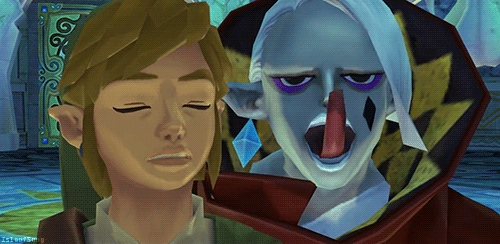
So, the biggest slap addition the lore that Skyward Sword gave us was (Her Grace) Hylia and (the Bringer of) Demise. Entities who, regardless of confusing localisation choices, exist as two sides of the same coin and are locked into a mutual karmic cycle.
They reflect each other like a mirror, and also represent an antithesis of each other, seemingly existing as consequence to one other. They were presented as the penultimate deities of the physical and metaphysical realms of their world since the advent of its creation by the departed Golden Goddesses; twinned yet opposite, and each both inevitable and necessary.
Shadow; Light. Chaos; Order. Indulgence; Restraint. Upheaval; Stability. Primordial; Designed. Spite; Grace. Hidden; Seen.
Ghirahim; Fi.
It goes right down to the blades that Demise and Hylia would level at one another. The spirits of each are a representative of the principles and philosophy championed by their creators.
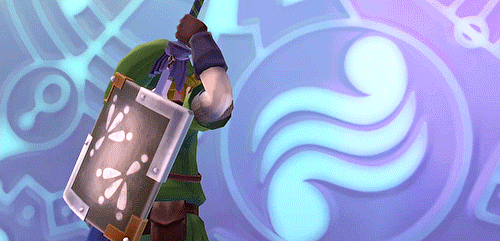
Now, the closer you get to the works and relics of the Gods/Gods Tribe in Zelda, the more you see divine constructs that blur the line of spiritual magic and advanced technology, and are ostensibly both. This was a direction that really bloomed in Skyward Sword, taking a running start on it that games hereafter have followed. The caveat is that only certain special people chosen by Gods or otherwise given permission to use this kind of Magitech can interact with it or produce things like it (either at all, or without punishment).
Even the Sheikah, who have closely served the intentions of the Gods/Spirits of Light (Hylia and her aligned) all throughout history, make the mistake of getting too comfortable in their inspiration and cross the line into imitations. Despite the successful utilisation of, and later recovery of, certain Sheikah Tech such as the Divine Beasts to positive effect, the tragedy of both the Sheikah's Divide and the Calamity's hijacking of Hyrulean defence systems is still played as a cautionary tale of hubris and knowing one's place in the natural order of things.
The Sheikah were effectively making unauthorised knockoffs of Divine Magitech and it bit them on the arse.
Can't have shit in Hyrule.
Pretty much every significantly advanced tribe in Zelda has a stated closeness to 'the Gods'. Either by being adjacent to or descended from deities and spirits collectively known as the Gods (specifically the Gods Tribe in JP), they are still distinctly subordinate to and separated from entities such as Hylia and the three Golden Goddesses.
Confirmed to be included in this special grouping are the Zonai and the Oocca, for instance. Speculatively, the Wind Tribe are an example of people who ascended (with permission or worthiness) from the surface-- they are an arguably Gerudo adjacent tribe who may even be precursors to the Zonai or related to the Twili.
The Picori, at the very least those in their native realm, also certainly count as part of this grouping. Though it could be argued whether those descent Minish living on the surface still do.
The Sheikah, it should be noted, have never gained entry to this Gods club. Despite their proximity in worship and service to Hylia, historically, they've also done some pretty shady things-- like the Shadow Temple and the general murder and espionage stuff -- that may have otherwise excluded them from ascending like the Wind Tribe did. They walk a grey line, and they have a duty in the eyes of the Powers That Be that apparently prefer they stay put.
Not Turtle-y enough for the Turtle Club.
Another example of this Icarus flying too close to the Sun type cautionary tale, and a far more egregious offender in the eyes of the Gods Tribe, are the 'Interlopers' who would eventually become the Twili. They were a tribe of people that, while squabbling with others, tried to take dominion of Hyrule (referred to itself as the Sacred Realm/Holy Land in TP) with powerful magic that more or less gave them a winning advantage. Specifically, the Crystal Stone of Shadow (the Fused Shadow) which greatly amplified their magical power.
Banished by the Spirits of the Light whole cloth into an underworld (lit. A Realm of the Dead) that we also know as the Twilight Realm, they have been shunned from the land they tried to conquer and transformed by shadow so much, they're now allergic to the light (without sufficient mystical power to bolster themselves).
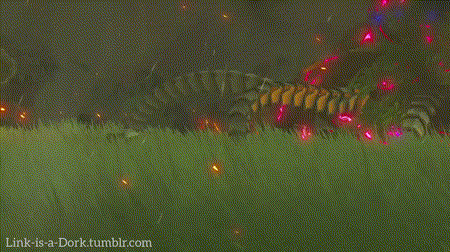
Basically, the intended message is this: any earthly people who have advanced themselves without approval by the Gods Tribe-- especially by using Divine Constructs as inspiration or means-- have therefore disrupted the order of things, and stacked the deck too much in their own favour. Even if the intent was primarily a fixation on preserving Hylia's bloodline, and by extension her sacred land, it is still possible to elevate oneself above your contemporaries (especially the capacities of the Royal Family line in Hyrule) in such a way that you impose too much independent influence upon the the natural world.
No longer following 'the way of the Gods' (the Gods Tribe law) or respecting the order of things (ala Shintoist inspiration), you are labelled a disruption to harmony and peace, and therefore seen as corrupted and pollutive, and generally negative in your impact. You will then be chased off, at the very least, unless you renege-- for fear that you will bring in demonic influences or be used by them. This has canonically happened to both the Gerudo and the Sheikah, now.
But you know who Magic Constructs on par with the Gods Tribe, except it's more eldritch and organic-looking and primordial in form? It's the other club, the one that the disenfranchised Sheikah went and banged on the door of, hoping to be let in if they started wearing cool red and black outfits and changed their name and stopped worshipping Hylia.
Yeah. It's the Demon Tribe-- who are pretty much just the inverse reflection of the Gods Tribe and its set up. Their Magitech equivalents, and what they can do, only serve to further cement this.
Specifically, if you could suggest that the Gods Tribe's main objective is maintaining a status quo of shared prosperity that provides an ordered and peaceful existence through conformity and tradition, the Demon tribe is an ever churning well of opportunity where winner takes all. It is a hierarchy built on brutal meritocracy, honed by constant challenges and hard won continuation-- survival and status fought for and maintained by individualistic influence and innovation.
Many various little bastards exist in the Demon Tribe. Bosses in charge of sub-tribes of monsters are commonly seen, but they have their minor Deities ad Spirits, too. The head honchos are called Demon Kings (plural, because it doesn't describe a single position, but rather just very powerful Demons who have clout). Demise is both a Demon King, namely the most powerful one, and also the 'Chief' of the Demon Tribe; just as, in this case, Hylia could be considered the 'Chief' of the Gods Tribe. So, Demon God-King, really.
While Demise is incapacitated by Hylia's seal, his role as the Chief of the Demon Tribe is actually the position that Ghirahim fills in for as his (literal) right hand man-- the very extension of his arm, as his blade.
Both the Master Sword (Fi) and Ghirahim himself are, perhaps, some of the most advanced forms of this sort of Magitech we've actually ever seen.
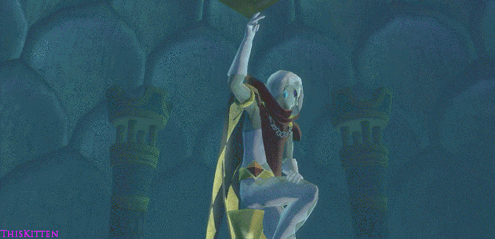
Ghirahim goes above and beyond in his role, even going so far as to cultivate his full persona as a Demon in his own right in order to maintain his authority as the effective Regent while the big boy is incapacitated. He disguises his true form and nature, and with a surprising level of autonomy and self-transformation for what he is, sets about attending his duties with great devotion.
He seems to have an incredibly intuitive and flexible mode of operation. His sentience is full of creativity, emotionality, and genuine potential that he has the capacity to explore and shape with great freedom, for the construct that he is.
He is flamboyant and attention grabbing, highly expressive. He entertains great personal indulgence, even going so far as to toy with Link in a manner that borders on vicious training for a while. Though in part due to his undeniable sadism, Ghirahim almost can't help himself but to continue to test and push against the potential as a swordsman that the Hero has, inadvertently cultivating its growth.
This depth of identity and adaption he's capable of was either an intentional part of his design, or specifically not prevented by it-- both of which stand to represent something of Demise and Demonkind. The lengths to which Ghirahim is allowed to wield himself when not in his creator's hand is remarkable and, though he is shown to be unable to override actual commands from his master, it stands in an interesting contrast to Fi.
Where Ghirahim is able to radically redefine his own presentation and function to best suit his Master's needs in a way that mimics the organic, Fi's evolution is far more linear and streamlined, never really deviating from systematic updates. Though the sword itself is subject to physical restorations, Fi's personal appearance is unchanged and reflective of her true shape, indicating that her tempering in the Sacred Flames is either a slow return to previous form or a pre-programmed and permanent upgrade set into motion by Hylia. It is also an evolution that is entirely dependant upon the actions of others, largely lacking the individual agency and flexibility that Ghirahim possesses.
Not to suggest that Fi is any less devoted to her purpose, however.
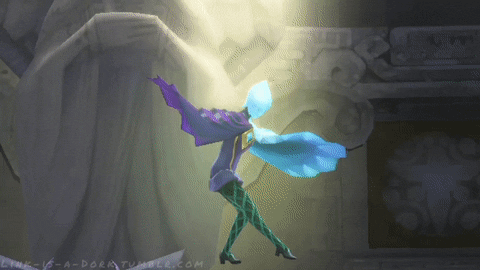
She is, quite unlike Ghirahim's aspect of individual advancement, wholly geared toward a model of mutual enhancement with a partner. She is built with a singular and clear objective in mind, perfectly designed to suit the needs of the one wielding her as a supplement to their ability, rather than an autonomous servant. She defers entirely to her Master's decisions at all times, though does make informed suggestions, and does not appear to be able to relocate the physical sword on her own. Many of her abilities are things that must be directly requested of her.
Even when she is given to performance, such as her singing or her ballet, these are seemingly dispassionate affairs that are precisely executed, preprogramed displays for Link's benefit. Absolutely nothing, not even particular inflections of emotionality, must risk the distortion of her relayed messages and guidance to Link-- these displays may also be something analogous to morale boosting rewards or a really weird form of reverence to the musically inclined Hylia. Either way, Fi is highly logical and presents herself foremost as an instrument and a tool. She does not indulge in a persona or otherwise engage in anything not directly tied to her assigned mission-- she does not get distracted or indulge personal whims as Ghirahim does. But critically, a large part of her design is geared towards an awareness of her surroundings. Fi has a visible consciousness for the living things around her at all times, contrasting to Ghirahim's seeming negligence of them and open disdain.
Fi's orderly efficiency and lack of cultivated personality to detract from her purpose make the fact of her construction obvious. Unlike Ghirahim, her true nature and her task is almost painfully undisguised. She exists in a simple sincerity, almost austere, seemingly unwilling or unable to seek function beyond her designation without being updated by another. However, her concentrated application seems to achieve concentrated results, strengthening both herself and her wielder in a near impenetrable mutual reinforcement.
It is perhaps of no coincidence that, despite Fi's seeming inflexibility and clinical pragmatism, she also expresses something of a fondness for Link at the end-- in many ways, mirroring her Divine creator. She does this very robotically, by correlating her collected data time spent together and their completed task with what she's observed of human happiness.
Skyward Sword seems to argue that Ghirahim's main flaw is spreading himself too thin, or trying to be so many other things, that he falls short as a sword in the end. It suggests that his sin, like others in the franchise, is getting too big for his boots scabbard and letting his pride become his downfall. His individualism gets presented with a great cost, as he has only enhanced himself in ways that seemingly do not apply when he returns to his primary function as a sword. The emotionality he has, such as the frustration and cockiness and bloodlust he indulges, are also shown to lower his successes-- reducing the sense of his efficiency and precision beside the ever level, measured Fi.
When he returns to Demise's hand, Ghirahim is already weakened and spent. Despite all he's done for his Master's revival, Demise is left to fight with a paling version of the blade that once fatally wounded Hylia-- not unlike a Master Sword in need of restoration to its full power.

There's a legend regarding Gorō Nyūdō Masamune, widely regarded as the greatest swordsmith in Japanese history, and Sengo Muramasa, who is famously known for creating unique and terrifically sharp blades that are considered cursed.
It starts when Muramasa challenges Masamune to see who can make a finer sword. When the work is done, they go down to a river, and place the blades in the water with the cutting edge towards the current.
Muramasa's sword, which he named Ten Thousand Winter Nights, cuts everything that floats its way-- leaves, fish, even the wind that happened across it. It is so sharp that nothing escapes unscathed.
Masamune's sword, named Tender Hands, is placed in the river and cuts the leaves that go by so seamlessly, they reform on the other side. Fish swim up to it and seem to be repelled by its aura, avoiding death. The wind kisses the blade gently with a pleasant whistle.
Muramasa isn't impressed by this. He thinks the blade is useless, barely cutting anything at all, and starts to remark on the lack of skill. Masamune smiles at the criticism, but merely compliments that Muramasa's sword is indeed quite sharp.
A monk who had watched all this from nearby approaches at that point, bows, and interjects with his own observations.
Though he too observes that Muramasa's sword is technically very finely made, he notes that it's a bloodthirsty, wicked blade. It cuts anything in its path indiscriminately, he says, and would just as soon cut a butterfly in half as remove somebody's head.
Masamune's sword, however, was the clear winner in the monk's opinion-- a gentle blade that did not needlessly cut that which was innocent or undeserving, tempered by grace. It is a benevolent sword, and so far finer made.
In popular culture, Muramasa's blades have held onto their violent reputation. There's a superstition that they can compel their wielder to murder. It has even been said that, once drawn, they can't be sheathed again until their thirst for blood is sated-- even if it has to drink from its own wielder.
They also had a weirdly consistent habit of maiming or killing members of the Tokugawa Shogunate, and so became an anti-Tokugawa symbol synonymous with the rebellion. So that's fun.
But Masamune was considered to be a very calm man, who was controlled and reserved and quite spiritual. Muramasa, though, was depicted as an aggressive man, who was a bit wild and kinda unpredictable. As far as the folk stories go, Muramasa is depicted as having been quite envious of Masamune. Unlike Masamune, who approached his craft as the art of achieving clean death, they say Muramasa needed to transfer his unhinged energy into his blades to keep from being overwhelmed by it himself.
Because their natures bled into the swords they created, it was believed that Masamune and Muramasa imbued them with purifying and demonic power, respectively.
Just as with Demise and Hylia and the swords that they created-- as inspired by such a legend-- the spirits inside of them represent their natures, as well.
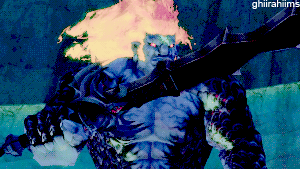
Wanna discuss how the Re:Zero storyline would look like (and how it would be marketed, lol) with any of the others as the main characters? I’ll go first:
For Emilia this is one of those wish-fulfillment romance books where a young, ostracized girl meets a powerful, mysterious, monstrous boy who is inexplicably devoted to her in his entirety. At first he doesn’t understand that she is a person and not a thing to be hoarded, but he soon realizes how he hurts her by failing to understand her as a human being and manages to change his monstrous ways for her sake. She and her maids have to teach him basic things like what is considered common courtesy, what is socially unacceptable, how to read… It is a story about a woman who has managed to be kind even in a world that seems intent on hurting her at every turn being rewarded for her kindness with a love interest who — admittedly has to learn to NOT be horribly toxic to her, but who does put in the work to do so, and who is always utterly in love with her.
For Roswaal it is a story about a very twisted protagonist who has been carefully making this time-traveling weapon of a boy in his own image — only for his plan to fail as his weapon gains a mind of its own and starts to rebel. And then as the rebellion succeeds, it becomes a story of a battle of wills, of him and the boy wrestling their wants and desires in order to achieve the best possible future for them both.
For Garfiel it’s a shonen sort of romp where things begin by his mysterious and powerful mentor character tearing down his walls and dragging him into the light practically kicking and screaming, introducing him into a world where he very well may not be the strongest thing alive anymore. He makes new friends, faces new foes, and grows stronger and stronger with each hurdle crossed as he trains and trains for his Captain and his Captain’s kind-hearted Lady, his reunited sister, the strong-willed girl he’s crushing on for years, his newfound brother figure — but all the while, and for all he looks up to the guy, it seems as though nobody can ever really put a finger on what exactly his Captain’s whole deal is.
For Beatrice it’s a story about how her life is turned around when the most annoying boy in existence shows up and gives her a way out of a prison that has kept her in her library for the past 400 years. This brat is very strange, even incomprehensible at times, but they slowly develop a brother-sister relationship as she grows more and more affectionate towards this mysterious stray brat of a contracted partner.
For Ram it’s some sort of sitcom surrounding the great resurrected Oni God, now living as the subordinate of the man who conquered her village years ago. Starring the loud boy next door with an obvious crush on her, her own conqueror/crush being a pathetic wet sock of a man with the moral backbone of a chocolate eclair, an incredibly annoying little brother figure who is her new coworker and also slightly insane, an alcoholic wet cat of a merchant, the young girl she is serving who slowly becomes her best friend — and also her comatose sister who has apparently always existed but whom she has no memory of past a few months ago.
For Petra it’s some sort of fairytale surrounding a young girl who is watching a mysterious stranger save her village time and time again. She thinks he’s just the coolest.
Omg that makes sense
I've had this thought for a while but only just realized I have a tumblr now so I can actually get that thought to reach ppl who'll share my level of madness.
So Sonic yeah? Pretty much the entire main cast are all anthropomorphic animals, excluding Eggman and his family tree. Across adaptations of Sonic, there's not a lot of consistency on what the general population outside of Sonic and the Gang are composed of. In shows like Boom, Prime, and the IDW comics, it's almost entirely animals, and Eggman's the odd one out:

But in other versions, where there are humans, Eggman still sticks out like a sore thumb:

It's also worth noting that in some Sonic games, there are regular, non-anthropomorphic animals in addition to anthropomorphic versions


(Yes, Vector is a crocodile not an alligator, but they're close enough taxonomically to be significant. You can't convince me that the difference between alligators and crocodiles in this universe is that one swims in freshwater and the other has bills to pay)
So here's my theory: there's cartoonish, anthropomorphic versions and realistic, non-anthropomorphic versions of the animals, right? So why wouldn't this extend to humans? After all, they're mammals just like hedgehogs and foxes are. AND THAT'S WHAT EGGMAN IS. He's an anthropomorphic animal like Sonic, it just happens to be that the animal he's based on is a human.
Eggman is an anthropomorphic human. He's human squared.
Thank you

Lol,that a fucking lie,Otto is freaking unhinged,dude is Fine with mass murder









-
 zenniediamond13 liked this · 2 months ago
zenniediamond13 liked this · 2 months ago -
 jpx0999 reblogged this · 3 months ago
jpx0999 reblogged this · 3 months ago -
 ardelien liked this · 3 months ago
ardelien liked this · 3 months ago -
 superbpastanickelzonk liked this · 3 months ago
superbpastanickelzonk liked this · 3 months ago -
 jphantasma liked this · 3 months ago
jphantasma liked this · 3 months ago -
 cookiedough77 liked this · 3 months ago
cookiedough77 liked this · 3 months ago -
 alesterwolf liked this · 3 months ago
alesterwolf liked this · 3 months ago -
 phieillydinyia liked this · 3 months ago
phieillydinyia liked this · 3 months ago -
 ninadove reblogged this · 3 months ago
ninadove reblogged this · 3 months ago -
 livinspired liked this · 3 months ago
livinspired liked this · 3 months ago -
 starsandheartsstuff liked this · 5 months ago
starsandheartsstuff liked this · 5 months ago -
 tellluzaboutit reblogged this · 5 months ago
tellluzaboutit reblogged this · 5 months ago -
 tellluzaboutit reblogged this · 5 months ago
tellluzaboutit reblogged this · 5 months ago -
 tellluzaboutit liked this · 5 months ago
tellluzaboutit liked this · 5 months ago -
 littlesunflowerexe liked this · 6 months ago
littlesunflowerexe liked this · 6 months ago -
 graceful-morning liked this · 7 months ago
graceful-morning liked this · 7 months ago -
 tuziehr liked this · 7 months ago
tuziehr liked this · 7 months ago -
 scifellgoddess liked this · 8 months ago
scifellgoddess liked this · 8 months ago -
 are-there-any-available liked this · 8 months ago
are-there-any-available liked this · 8 months ago -
 astrumnoceur liked this · 9 months ago
astrumnoceur liked this · 9 months ago -
 stuck-in-a-constant-daydream liked this · 9 months ago
stuck-in-a-constant-daydream liked this · 9 months ago -
 jpx0999 liked this · 9 months ago
jpx0999 liked this · 9 months ago -
 strangeobjectcoffee liked this · 9 months ago
strangeobjectcoffee liked this · 9 months ago -
 marichatrien reblogged this · 10 months ago
marichatrien reblogged this · 10 months ago -
 doctor-ciel liked this · 10 months ago
doctor-ciel liked this · 10 months ago -
 wisteriasymphony liked this · 10 months ago
wisteriasymphony liked this · 10 months ago -
 whatamidoingherehelpme reblogged this · 10 months ago
whatamidoingherehelpme reblogged this · 10 months ago -
 whatamidoingherehelpme liked this · 10 months ago
whatamidoingherehelpme liked this · 10 months ago -
 ragitty liked this · 11 months ago
ragitty liked this · 11 months ago -
 laronez liked this · 11 months ago
laronez liked this · 11 months ago -
 spoooooon liked this · 11 months ago
spoooooon liked this · 11 months ago -
 gabrielisabutterfly liked this · 11 months ago
gabrielisabutterfly liked this · 11 months ago -
 differentpandakitty liked this · 11 months ago
differentpandakitty liked this · 11 months ago -
 herbalisticannibal liked this · 11 months ago
herbalisticannibal liked this · 11 months ago -
 coralnerdbakerydream liked this · 11 months ago
coralnerdbakerydream liked this · 11 months ago -
 yourfavoriteconifer liked this · 11 months ago
yourfavoriteconifer liked this · 11 months ago -
 arson-the-crime-brulee reblogged this · 11 months ago
arson-the-crime-brulee reblogged this · 11 months ago -
 arson-the-crime-brulee liked this · 11 months ago
arson-the-crime-brulee liked this · 11 months ago -
 lemons-taste liked this · 11 months ago
lemons-taste liked this · 11 months ago -
 vvanyr liked this · 11 months ago
vvanyr liked this · 11 months ago -
 dragonhoardsfriends reblogged this · 11 months ago
dragonhoardsfriends reblogged this · 11 months ago -
 dragonhoardsfriends liked this · 11 months ago
dragonhoardsfriends liked this · 11 months ago -
 rabbitholefor-anymediailike reblogged this · 11 months ago
rabbitholefor-anymediailike reblogged this · 11 months ago -
 thatscottishbisexual liked this · 11 months ago
thatscottishbisexual liked this · 11 months ago -
 hirac-delesbian liked this · 11 months ago
hirac-delesbian liked this · 11 months ago -
 harrietjn liked this · 11 months ago
harrietjn liked this · 11 months ago -
 sparkly-dream liked this · 11 months ago
sparkly-dream liked this · 11 months ago
